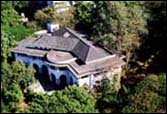Commentary/Mani Shankar Aiyar
An India-Pakistan dialogue must not only be
uninterrupted but uninterruptable
 We, therefore, have to go back to 1982 to find an opportunity
in Indo-Pak relations comparable to what is now rising, along
with Sharief, Phoenix-like from the ashes of earlier reverses.
I returned to India from my assignment in Karachi in early January
1982. A few weeks later, January 29, 1982 to be precise, then Pak foreign
minister Agha Shahi arrived with a large contingent of civil servants
and diplomats and an army of mediapersons. They were received
at the airport, taken to the Beating Retreat at Vijay Chowk, entertained
to dinner at Hyderabad House, and packed off to bed.
We, therefore, have to go back to 1982 to find an opportunity
in Indo-Pak relations comparable to what is now rising, along
with Sharief, Phoenix-like from the ashes of earlier reverses.
I returned to India from my assignment in Karachi in early January
1982. A few weeks later, January 29, 1982 to be precise, then Pak foreign
minister Agha Shahi arrived with a large contingent of civil servants
and diplomats and an army of mediapersons. They were received
at the airport, taken to the Beating Retreat at Vijay Chowk, entertained
to dinner at Hyderabad House, and packed off to bed.
Instead of
letting us do the same, then external affairs minister Narasimha Rao
asked the Indian delegation to stay behind for a strategy pow-wow.
Wearing a puzzled frown on his brow and his trademark pout more
prominently than even customary on his lips (characteristic of
PVN in deep thought -- like Deve Gowda asleep!), he asked in puzzled
tones, "Why have these people come here?" Many explanations
were offered.
Fifteen years on, I stick to the explanation I then
gave. Zia-ul Haq, I said, has authority but lacks legitimacy.
He cannot secure legitimacy by securing an endorsement through the
ballot-box. But he can consolidate his claim to leadership by
demonstrating that he can seriously engage India in dialogue.
The visit led to the establishment of a structure and pattern
for a meaningful dialogue, but was torpedoed before it took off
by a spat over Kashmir in distant Geneva between two has-beens,
Agha Hilaly and Bali Ram Bhagat. But the thread was taken up by
Rajiv Gandhi when he became prime minister.
In his first year
in office, Rajiv met Zia some half-a-dozen times. The dialogue
was kick-started in January 1986, ran into the usual difficulties
and finally floundered on the shoals of the Operation Brasstacks-related
confrontation of January 1987.
Rajiv, however, invited Zia to
a luncheon meeting to defuse the tension. The trust this generated
brought India and Pakistan close to an agreement on Siachen --
but just as it was about to be tied up, Zia was killed in an aircrash.
Benazir came to power in the wake of the assassination of her
father's assassin -- and what happened thereafter, I have already
recounted.
If the conjunction of events in 1997 is as hopeful as it appeared
to be in 1982, my belief in present possibilities is founded in
the same appreciation of Pakistan's domestic compulsions. Then
it was a matter of garnering legitimacy for a desperately unpopular
regime; now it is the Pak fiscal deficit. It is easy to accuse
those of us who favour a co-operative relationship with Pakistan
of being Pollyannas. But even Pollyannas cannot do their good
deeds unless the circumstances are right. Those circumstances
are right: there is a domestic compulsion, this time of a fiscal
nature, to defuse tensions with India; Nawaz Sharief made the relationship
with India a key plank of his electoral platform; Benazir has
admitted that her hawkishness did not go down well with the Pak
voter; in Gujral we have an interlocutor, known trusted and respected
in Pakistan; in J&K under a popular government we have a measure
of normalcy and in Chief Minister Farooq Abdullah a genuine spokesman
of the Kashmiri cause; Nawaz, as a Punjabi, does not have to look
over his shoulder at Pakistani public opinion tripping him up;
and the Pakistan Council for Defence and National Security, whatever
its baleful effects on democracy, has the inestimable advantage
of providing a forum for high-level interaction between the political
authority and the armed forces, thus opening the avenue to consensus
in lieu of brute strength overruling a brute majority.
I have expatiated in these columns and elsewhere on what we need
to do to ensure that the India-Pakistan dialogue, it if begins,
is so structured, through talks about talks, as to be not only
uninterrupted but uninterruptable. And the mechanics of this were
set out in my Pakistan Papers. I will, therefore,
move quickly to the complementary element of stage setting: atmospherics.
We must, I think, unilaterally move to the fulfillment of the
pledge we made to Pakistan to let them have Jinnah House in Bombay
for their consul-general's residence. They have not been able
to make a shrine of Liaquat Ali Khan's home in New Delhi, which
is their high commissioner's residence; it seems a bit paranoiac
to imagine that they will succeed in subverting the loyalty of
the Indian Muslim by butting up faded photographs of the Quaid-e-Azam
for public viewing. And if Pak academic turned-film-maker, Akbar
S Ahmed is reduced to spluttering indignation over Mountbatten's
complaisance, then surely 50 years after Independence we, as a
people, should have the self-confidence to take even the screening
of Jinnah in Jinnah House in our stride.
Tell us what you think of this column
|





